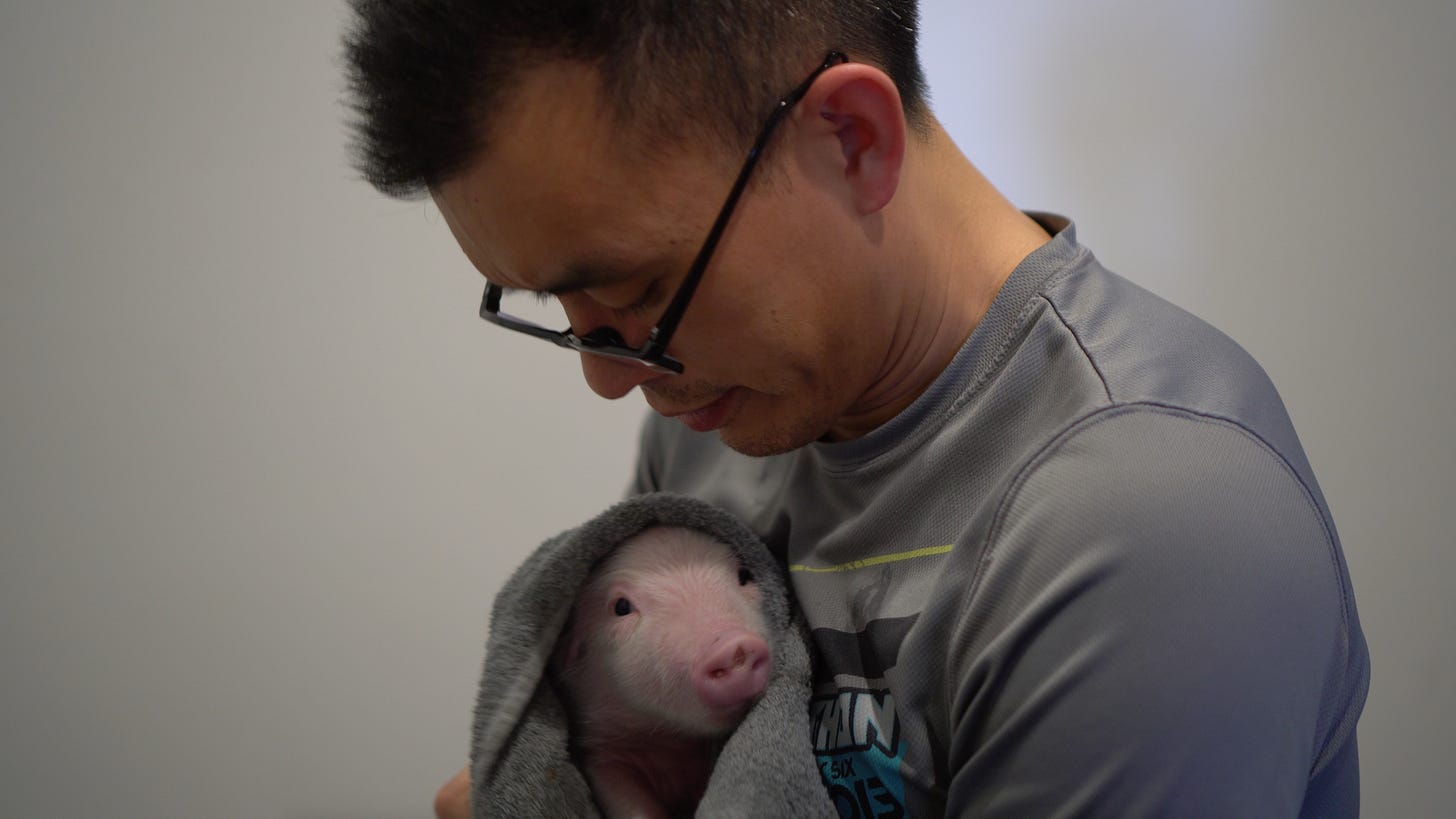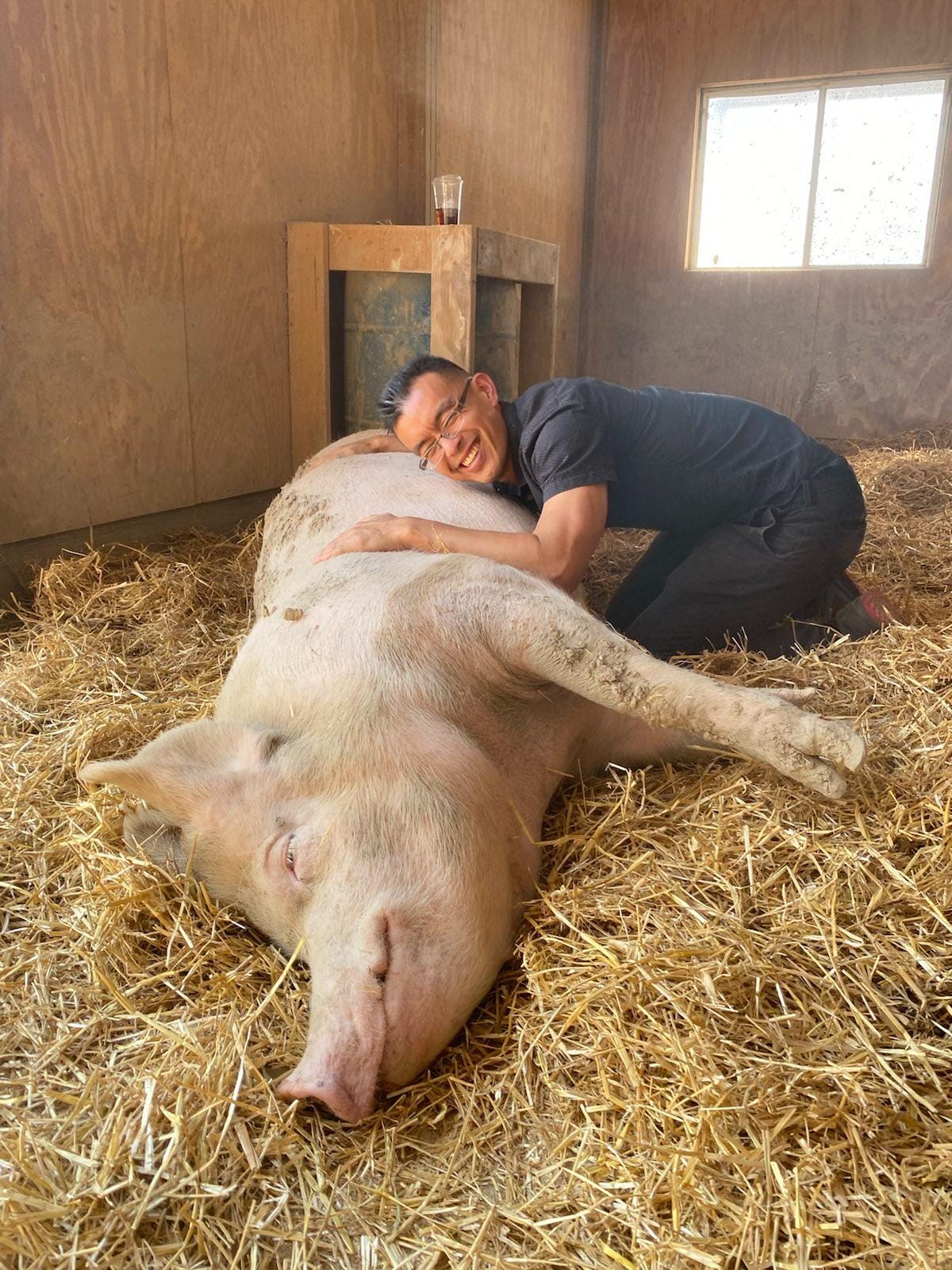What an FBI "piglet hunt" shows us about power and trust
Apprehending a piglet rescued from a factory farm became a national law enforcement priority. Here's why that matters.

In the summer of 2017, I was part of an investigative team that released a first-of-its-kind investigation of the largest pig farm in the nation. The investigation was notable not only because it documented violations of the company’s own policies — including the use of “gestation crates” (i.e., metal cages that confine a mother pig in a space nearly as small as her own body) — but because of our use of virtual reality (VR) technology. We borrowed a prototype camera from a tech startup, and we documented everything at the Smithfield facility in 360 degrees. The VR experience we later published was featured in WIRED and The New York Times and contradicted an industry talking point: “The video shows only an isolated instance and is not representative of our company.” People across the globe could put on a VR headset and see everything in the farm, including the torment of hundreds of mother pigs. They could also virtually walk with us as we rescued two sick and starving piglets, Lily and Lizzie, and rushed them to an animal sanctuary for emergency medical care.
Then, a few months later, I got a call that would change my life.
“Wayne, the FBI is here, and they’ve done something terrible to one of the baby pigs.”
It was a shocking phone call that was the beginning of my career as a professional defendant. And for the first time, the voice on the other end of that line, Shaleen Shah, founder of the animal sanctuary Luvin’ Arms, is speaking publicly about what happened.
Listen to the full podcast with Shaleen Shah on The Green Pill site.
The story is so bizarre that many people think I’m joking when I tell it. FBI agents crossing state lines, in a small armada of four black SUVs, to hunt down a baby pig? Armed men holding a mostly-female team of animal rescuers hostage, while they engage in acts of comic book villainy against innocent animals? You can’t be serious!
But the story goes from comical to dark when you hear the details from Shaleen. And there are three points that it’s important to take way from this conversation.
The first is that unthinking allegiance to authority is widespread — and can take us to dark places. The FBI agents who came to Shaleen’s sanctuary on that day in August must have wondered why they were doing what they were doing. And Shaleen shares some fascinating details about how the lead agent, in particular, began to doubt his own actions. As volunteers wept and a baby pig screamed in pain, he stopped the process of “DNA sampling” before it was completed.
And while it’s easy for us to judge these agents — and condemn their sociopathic disregard for the suffering they were inflicting — it should serve as a cautionary tale, as all of us are beholden to authority structures that may lead us astray. A famous study by the legendary psychologist Stanley Milgram showed that 65% of people would, when instructed by an authority figure, impose electric shocks on an experimental subject to the point that the subject cried out in pain and went unconscious.
While it’s easy to judge the absurdity of these agents’ actions, it’s harder to think about situations where we ourselves might blindly follow orders, even when those orders are causing serious harm.
The second point is that trust is easy to lose and hard to win. Sanctuaries are places of recovery from trauma. The FBI raid at Luvin’ Arms shattered that peace and re-traumatized a piglet who was just learning to feel safe around human beings. One of the most heartbreaking parts of this story is Shaleen’s description of Lizzie the piglet, staring listlessly into a wall for months after being mutilated by the FBI. She lost her trust in the kindness of this world.
But the damage was not just to one piglet. Shaleen, a law-abiding citizen who has never been in serious trouble, may never see law enforcement the same way. The animal caretakers who witnessed the brutal use of force against a vulnerable baby will likely never forget that day. And many of the millions of people who read the story of the FBI raid, after a Pulitzer Prize winning journalist wrote a 6000-word story about the incident, lost faith in their government’s law enforcement priorities.
When violence is unaddressed, it instills in us a mentality called “learned helplessness.” We are taught that the world is a cruel place, and that there’s nothing we can do about it. And while learned helplessness is shockingly quick to imprint into an animal — the pioneering study performed on dogs showed that a short period of electric shocks was enough — it can lead to a lifetime of distrust and depression.
This is not just a psychological but a political principle. Abuse of power of the sort that unfolded at Luvin’ Arms can feed into a negative cycle of distrust. And that leads us to learned helplessness, even in situations where it’s possible to create positive change.
But that brings us to the third point: distrust can be cured by kindness. Just a few weeks ago, I saw Lizzie for the first time in 2 years. And her fear and depression have been transformed into warmth and affection. It was a hot day, and she was lying in the shade. She looked up at me with curiosity as I approached, and with no inkling of the fear that she had previously been afflicted with. I pet her head. Then I started scratching her belly. And when she rested her head and body — all 700 pounds of it — back onto the ground, with a satisfied groan, I knew she felt safe. After a few minutes, I rested my own head on her torso and listened to her heartbeat.

The way she found peace, however, was not from avoiding that which she feared. Instead, the sanctuary continued to expose her to human kindness. And years later, Lizzie has made a full recovery. She is the pig she was meant to be.
There are lessons here for us personally and politically. Many people think that the solution to distrust is education and information. Efforts to censor bad information operate under this theory. The problem, the theory goes, is that people are hearing inaccurate things. If we just showed people — or animals, in the case of the dogs suffering from electric shocks — that there was a way out of the problem, then they’d come along. Vaccine misinformation. Climate denial. Animal suffering. According to this theory, we can educate our way out of the problem by stopping misinformation.
This misdiagnoses the problem. Distrust isn’t caused by the wrong type of information. It’s caused by people’s lost faith in kindness. Consider vaccine distrust. While our political system is saturated with animosity or even hatred towards those who refuse the vaccine, the single most important predictor of vaccine hesitancy is not race or politics or creed. It’s whether someone has health insurance. Those who lack insurance are unwilling to trust a system that has shown them no kindness. And the only way to restore that trust is not to censor the conspiracy theories, but to show the people who believe in those conspiracy theories genuine kindness.
Shaleen, and his family and staff, have done a remarkable job at this. Not only for Lizzie, the poor piglet whose trust was betrayed, but who was nursed back to health and life. But even to the FBI agents who inflicted so much harm on him and his loved ones. I was struck by how Shaleen, even as he unflinchingly described the abuses engaged in by the FBI, maintains his belief in the fundamental decency of the individual human beings who took part in the abuse. Shaleen understood that our obedience to authority and conformity are not proof of human malice or evil, but indications that we humans are animals, too. And, like all animals, we have our failings.
To do this conversation justice, however, you really just have to listen to it the podcast. Give it a try, and tell me what you think.
PS. I’ve written much less over the past month, mostly because I’ve been busy representing my friend Matt in a trial unfolding in Iowa. But the plan to move forward with a new community organizing platform is in the works. Accompanying that will be more posts to this blog, at least one a week starting in February. I’ll say more by next Monday.


Lizzie's and Shaleen’s stories are so important for everyone to hear. Great podcast, Wayne! Adorable pictures of you and Lizzie.
brilliant.